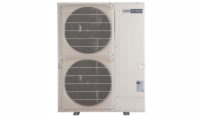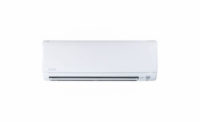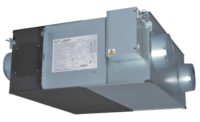METUS Heat2O® Heat Pump Water Heater is an all-electric, cold-climate heat pump water heater designed to reduce the environmental impact of high-volume domestic hot water (DHW) through energy-efficient operation using CO2 refrigerant. The system includes components designed and selected to ensure installation quality and optimal performance of the heat pump, including hot water storage tanks, swing tanks, secondary heat exchangers, and variable-speed secondary circuit pumps. It was these features and more that propelled the Heat2O to the front of the line as the 2022 Commercial Comfort Product of the Year in the Heating Equipment category.
The unit’s use of CO2, a natural and environmentally friendly refrigerant with a global warming potential (GWP) of 1 and an ozone depletion potential (ODP) of 0, is designed to help commercial facilities qualify for rigorous sustainability criteria and certifications, such as passive house status. As such, the Heat2O reduces on-site carbon emissions in the production of DHW.
The system is designed to achieve highly efficient heat exchange using Mitsubishi Electric’s patented Twisted Spiral Gas Cooler, where three refrigerant lines are wrapped around a twisted water pipe. The CO2 refrigerant flows in the opposite direction of the water. Running the refrigerant lines along the pipe’s grooves increases the heat conductive area while the spiral helps create a vortex in the pipe, accelerating the turbulence effect of water and reducing pressure loss in the heat exchanger. Transferring ambient thermal energy from outdoor air to potable water by cycling refrigerant, natural CO2 enables the system to supply hot water up to 176°F even when outside temperatures are as low as minus 13°.
“Mitsubishi Electric's INVERTER-driven scroll compressor in the outdoor unit increases Heat2O’s energy efficiency by enabling the system to modulate refrigerant flow and heating capacity to match loads,” said James DeBerry, commercial marketing manager, Mitsubishi Electric Trane HVAC US. “This technology enables Heat2O to provide over four times more energy as heat than the system consumes in electricity. With a coefficient of performance of up to 4.52, Heat2O offers energy savings up to 60%-70% for building owners and tenants compared to electric-resistance water heaters. Energy savings combined with incentives from utilities can ultimately offset first costs. If employed at scale in the U.S. alone, the environmental impact could be significant, if not monumental, and will revolutionize how buildings meet the demand for DHW.”
The innovation is already in demand for commercial buildings looking to meet aggressive sustainability and energy cost measures:
- Preliminary data from a recent pilot application for a Seattle Housing Authority multifamily dwelling, Bayview Tower, indicates Heat2O will save the housing authority more than 136,875 kWh/year (a 40% decrease). This equates to about $15,000 in operational savings annually (using $0.11/kWh electrical rate). Previously, the building relied on an aging electric boiler system to produce DHW for 100 one-bedroom apartments on 13 stories.
- Hotel Marcel, a $50 million renovation of the historic Pirelli building in New Haven, Connecticut, will be among the first net-zero hotels in the U.S. Slated to open this year, Hotel Marcel is aiming for LEED Platinum certification and being 60% more energy efficient than code requirements. A Heat2O system was installed to achieve the project’s sustainability goals.
METUS provides on-site support with assisted startup/commissioning for every project both with mechanical and controls expertise. This includes owner and contractor training. In addition, METUS is rolling out installation and service training courses to enable contractors to feel comfortable working with our systems.
“Heat2O is controlled through Mitsubishi Electric’s Building Connect+ cloud-based platform, allowing building managers and service providers to easily set schedules for hot water production and maintenance,” DeBerry said. “The system can simplify demand-response participation and load shifting with a utility virtual end node integrated into the control panel.”
A Winning Formula
Climate change was on the mind of our judges, with several of them acknowledging the Heat2O’s commitment to climate stabilization as a key factor in their decision.
“Refrigerant-based systems that are replacing traditional fossil fuel-burning systems must consider low GWP in their designs to avoid inadvertently counteracting the carbon emission improvements that were intended,” said one judge. “This unit does just that.”
“With low flammability, low toxicity, and a GWP of only 1, the use of CO2 in Heat2O is the future of commercial water heating,” said another judge.






